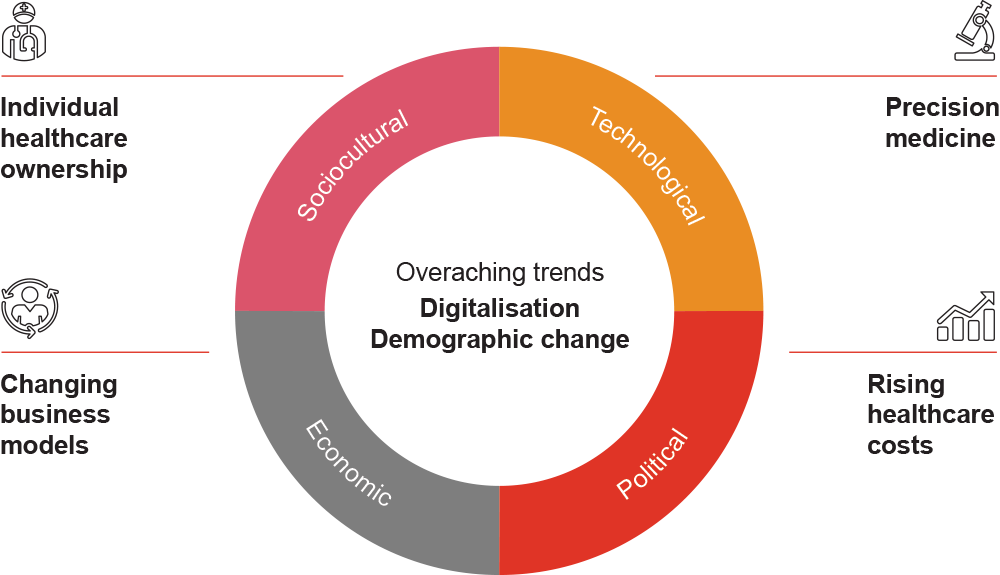The pharmaceutical industry is one of the major drivers of the Swiss economy. We are providing a snapshot of the major trends of the industry, including digitalisation, individual healthcare ownership, and precision medicine. Are companies operating in Switzerland ready to capture the potential from these trends?
The Swiss pharmaceutical industry was responsible for 38% of all Swiss exports in 2017 (volume, as compared to 32% in 2016) and over the past decade has consistently grown faster than the overall economy (by 7.2% between 2006 and 2016) (Interpharma, 2018). According to Interpharma, the number of employees has risen four times higher than the average economy in the past two decades, reaching 45,500 employees in 2016, with these employees being more than four times more productive on average than the overall economy. Yet, is the Swiss pharmaceuticals industry prepared for what is coming in the next decade? What are the major trends shaping the future of the Swiss pharmaceutical industry? We have pinpointed six closely interconnected trends, which should be on the radar of any pharmaceutical company operating in Switzerland.

Overarching trends: demographic change and digitalisation
Of all the salient “mega-trends” affecting the healthcare landscape at all levels, we expect that demographic change and digitalisation will have the greatest impact on the pharmaceutical industry. By demographic change, we mean an ageing population, leading to multimorbidity and higher prevalence of chronic non-communicable conditions, ultimately increasing the need for more healthcare personnel and therapies to be available, thereby further increasing the cost of the healthcare system. New care models and technologies, such as telemedicine or ambient assisted living, will play a crucial role in limiting such rising costs.
The increased use of digital technologies by the industry and the population as a whole will have a significant impact on biomedical research and the healthcare system in its entirety. From artificial intelligence in drug discovery to real-world evidence-based analyses using health records (once health data is made interoperable between hospitals), digitalisation is revolutionising the way healthcare is delivered, as players in the healthcare ecosystem are enabled to operate more effectively. For instance, in the future, health records may be made available to any connected health care provider in the world, and will be leveraged by pharmaceutical players to run clinical trials more efficiently by identifying the right patient for the right study at the right time. Whilst the younger part of our population seems less worried about the use made of their personal data, applying sufficient data protection safeguards continues to be crucial if a sound foundation is to be established for harvesting the enormous potential provided by digital healthcare. In order to better understand what pharma companies should consider for their successful digital transformation, have a look at our recent publication “Going Digital in the Health Industries “.
Major technological trend: precision medicine
Propelled by the genomic revolution, and bolstered by recent developments in biomedicine and bioinformatics, precision medicine holds out the promise of radically improving individual patient outcomes. A deep understanding of individual patient’s health status, integrating patient data, ranging from their profiling at molecular level to their daily lifestyle data, will set the ground for more predictive, preventive, personalised and participative patient care. Expectations differ as to whether this burgeoning understanding of individual disease types will lead to cost reductions through better prevention options or even through cures rather than treatments, or whether individualised treatments will ultimately increase overall healthcare costs. According to a recently published study by PwC Strategy&, in which 100 pharmaceuticals managers were interviewed, precision medicine is expected to lead to clinical studies with smaller patient groups, with better results being achieved through clinical trials, and thereby a shorter time-to-market for innovative medicine.
Major political trend: rising healthcare costs
Healthcare costs in Switzerland rose between 2011 and 2015 from 10.8% to 12.1% of GDP and are expected to rise further. The main reasons for the increasing costs are more chronic conditions, multimorbidity and misplaced incentives in the healthcare system. New technological advances (e.g. remote care) and health cooperation models have the potential to mitigate the cost rise. However, the surge in healthcare costs may be viewed as a logical consequence of a well-functioning and high-quality healthcare system, providing significant individual and economic benefits. The consequent cost-benefit discussion building within society is increasingly trying to answer the questions of whether the Swiss population would consider capping healthcare costs, or whether healthcare remains a “financial priority” for society as a whole.
Major economic trend: changing business models
New technologies and cost pressure are driving organizations to explore new forms of partnerships across the health industry, and to re-think the degree to which their value chain is integrated. For several years now, the pharmaceutical industry has been becoming less vertically integrated. For instance, pharmaceutical companies are increasingly focusing their efforts on marketing drugs, with sales of products developed by a different entity becoming more significant than the sale of products developed in-house: revenue increase from externally sourced products was significantly higher in the period from 2005-2014 than from internally developed products, as shown by a Datamonitor study in 2016. Similarly, pharmaceutical companies are reducing their manufacturing footprint by selling manufacturing sites to a growing number of contract manufacturing organizations (CMOs). As shown by a recent survey by PwC Switzerland, further down the value chain, at the healthcare provider level, CEOs from Swiss hospitals expect a range of new business models to be developed by healthcare providers in the coming years, such as an extension of ambulatory walk-in clinics.
Major sociocultural trend: individual healthcare ownership
Given the high adoption rate of health-related technology, digitalisation has provided the means for individuals to instantly access both general and personal health information. This is leading to greater health awareness among the population, which is, in turn, fueling rising expectations as regards individual care. Future patients expect to be involved in all kinds of health decisions and to receive tailored care: the patient’s role is rapidly evolving from being an “object” to being a “subject”. Patients are increasingly taking ownership of their own health. At the same time, this “consumerism of healthcare” means that the difference between healthy and sick is being blurred, and a degree of “health mania” can be observed in the population. In this context, it is interesting to have a deeper look at our public brainstorming at the Swiss digital day on people’s wishes for the Swiss healthcare system.
These are all relevant trends and developments that are shaping the future of the Swiss pharmaceutical industry.
There are, however, other overarching trends, such as globalization, and new developments, such as increasing data protection regulations, new reimbursement models and immigration restrictions, that are worth considering. We plan to discuss further topics that are on the agenda for Swiss-based pharmaceutical companies over the coming months based on our market view. These topics will include value-based pricing and patient group engagement by big pharma. Stay tuned for discussion of these topics through this channel.
Key findings
- The pharmaceutical industry is one of the major economic drivers of the Swiss economy
- We discuss six trends which are mostly influencing the agenda of pharmaceutical companies operating in Switzerland
- These trends include amongst others digitalisation, individual healthcare ownership, and precision medicine
- From your point of view, which other trends or developments are shaping the future of Swiss-based pharmaceutical companies?









